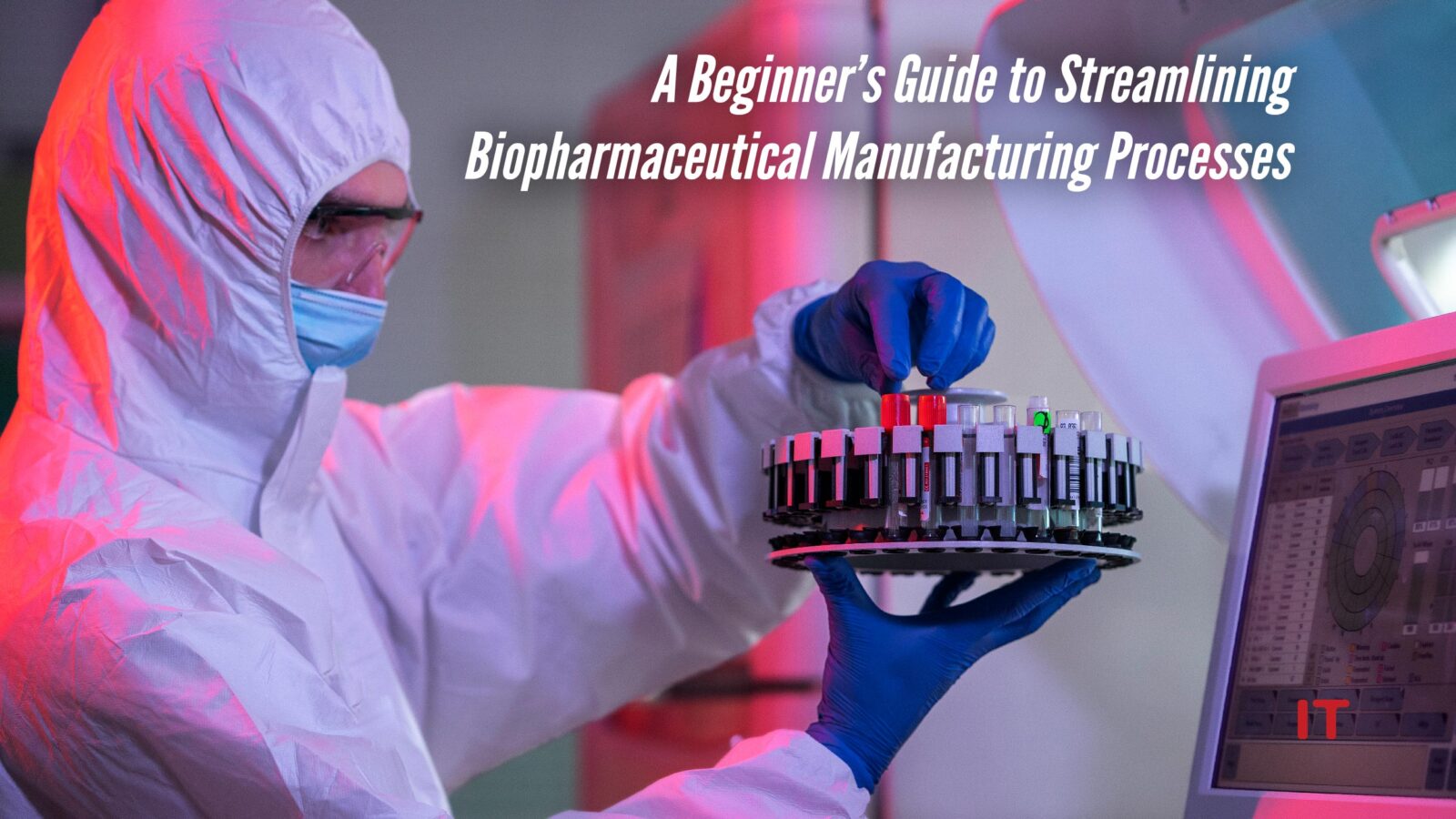In the dynamic world of biopharmaceuticals, companies are constantly seeking ways to optimize their manufacturing processes. Streamlining these operations not only enhances efficiency but can also lead to better product quality, increased safety, and reduced costs. This guide provides an overview of the key strategies for streamlining biopharmaceutical manufacturing processes.
What Is Biopharmaceutical Manufacturing?
Biopharmaceutical manufacturing involves producing therapeutic drugs using biological sources like proteins, nucleic acids, and monoclonal antibodies, known as biopharmaceuticals. These drugs, derived from living organisms, offer enhanced efficacy and safety compared to traditional pharmaceuticals. Some notable biopharmaceutical manufacturing companies are Jazz Pharmaceuticals, Incyte Corp., Novavax, Inc, GlaxoSmithKline (GSK), AstraZeneca, and much more.
The manufacturing process comprises key steps:
- Upstream Processing: Involves cultivating living cells to act as production factories for therapeutic proteins. Cell culture techniques optimize growth conditions, and fermentation scales up cell and protein production.
- Downstream Processing: Purifies and isolates target molecules produced by cells, utilizing techniques like chromatography, filtration, and centrifugation to ensure a pure drug substance.
- Formulation: After purification, the drug undergoes formulation to enhance stability and solubility. Excipients and buffer solutions are added to create a final dosage suitable for administration.
- Fill-Finish Operations: The final step includes filling the formulated drug into delivery systems like vials or syringes, followed by sealing, labeling, and packaging for distribution.
Top 6 Advancements In Biopharmaceutical Manufacturing Facility
 Advancements in biopharmaceutical manufacturing have profoundly transformed the industry, enhancing the production of life-saving drugs. Key developments include:
Advancements in biopharmaceutical manufacturing have profoundly transformed the industry, enhancing the production of life-saving drugs. Key developments include:
- Digitalization and Analytics: Integration of digital and analytics technologies has boosted quality, speed, agility, and resilience in manufacturing processes. Real-time monitoring and data analytics enable better control, optimization, and predictive maintenance.
- Improved Processes and Technology: Evolving manufacturing processes and technology cater to the demands of innovative biologics. Automation and robotics enhance precision, reduce errors, and increase efficiency. Single-use systems gain popularity for contamination risk reduction and improved flexibility.
- Advanced Therapies: The advent of gene and cell therapies marks a new frontier. Specialized techniques and infrastructure are essential for manufacturing processes to ensure safety and efficacy.
- Outsourcing and Contract Manufacturing: Increasingly common outsourcing, especially for smaller biotech firms, with contract development and manufacturing organizations (CDMOs) providing expertise, capacity, and resources.
- Rapid Clinic Trials: Focus on accelerating drug development to clinical trials with instrumentation advancements like colony pickers, micro-bioreactors, and label-free biolayer interferometry systems streamlining processes.
- Quality Assurance and Regulatory Compliance: Emphasis on ensuring safety, efficacy, and quality. Regulatory standards, including good manufacturing practices (GMP), adapt to advancements in manufacturing technologies and processes.
These advancements have significantly improved production efficiency, expanded access to life-saving therapies, and elevated patient outcomes in biopharmaceutical manufacturing. Continued technological progress promises ongoing innovation and further advancements in biologics production.
What is the Significance of Biopharmaceutical Manufacturing?
Biopharmaceuticals hold paramount importance in healthcare, offering enhanced efficacy and specificity compared to traditional drugs. They spearhead personalized medicine, tailoring treatments to individual characteristics, and revolutionizing the approach to previously incurable diseases. Beyond treatment, some biopharmaceuticals serve diagnostic purposes, aiding in disease detection and monitoring. The industry witnesses robust growth, reflected in increased patents, indicating a focus on innovation and rising demand. Patient outcomes have markedly improved, especially in cancer, autoimmune disorders, genetic diseases, and rare conditions. Additionally, biopharmaceuticals, perceived as having lower environmental risks, contribute to potential eco-friendly healthcare practices. As market dynamics evolve and intellectual property expands, biopharmaceuticals are set to play an increasingly vital role in shaping the future of medicine and healthcare.
Overcoming Challenges in Streamlining Biopharmaceutical Manufacturing
Navigating the journey to a streamlined biopharmaceutical process is often laced with obstacles. The adherence to stringent regulatory standards during any process modifications presents a significant hurdle. Coupled with this, the workforce needs to adapt swiftly to changes, and the initial costs of deploying innovative technologies can seem daunting. The road to streamlining, while filled with potential pitfalls, can be traversed successfully with a well-thought-out strategic plan, allowing companies to reap the rewards of a more efficient, productive operation.
Future Trends in Biopharmaceutical Manufacturing Streamlining

Peering into the future, the biopharmaceutical landscape is poised for exciting transformations. Pioneering technologies such as robotics, machine learning, and even virtual reality are on the horizon to further fine-tune manufacturing processes. As the industry begins to pivot towards personalized medicine, adaptability and flexibility in production are becoming paramount. Embracing these emerging trends allows biopharmaceutical manufacturers to continue honing their operations, ensuring they remain at the forefront of the rapid evolution of drug development.
Final Takeaway
Biopharmaceutical manufacturing is a dynamic and essential field that brings life-saving therapies to patients. With its ability to produce targeted and effective treatments, contribute to personalized medicine, and address previously unmet medical needs, biopharmaceutical manufacturing holds immense significance in the healthcare industry and the pursuit of improved patient care.

































